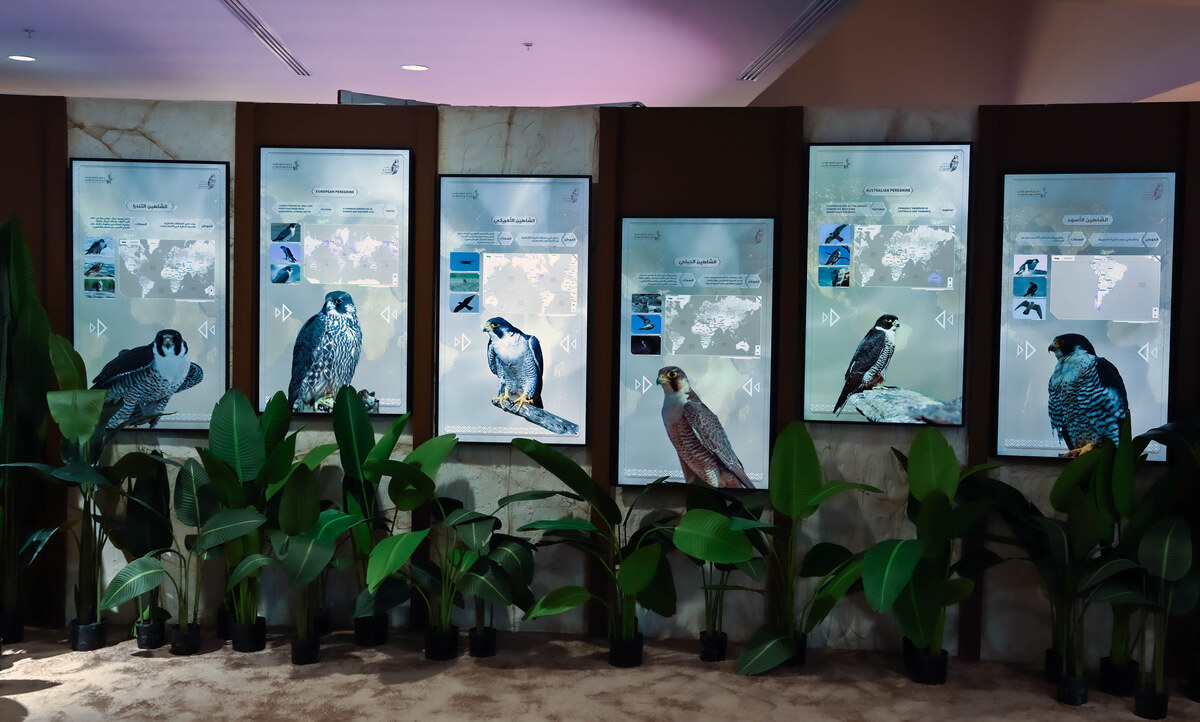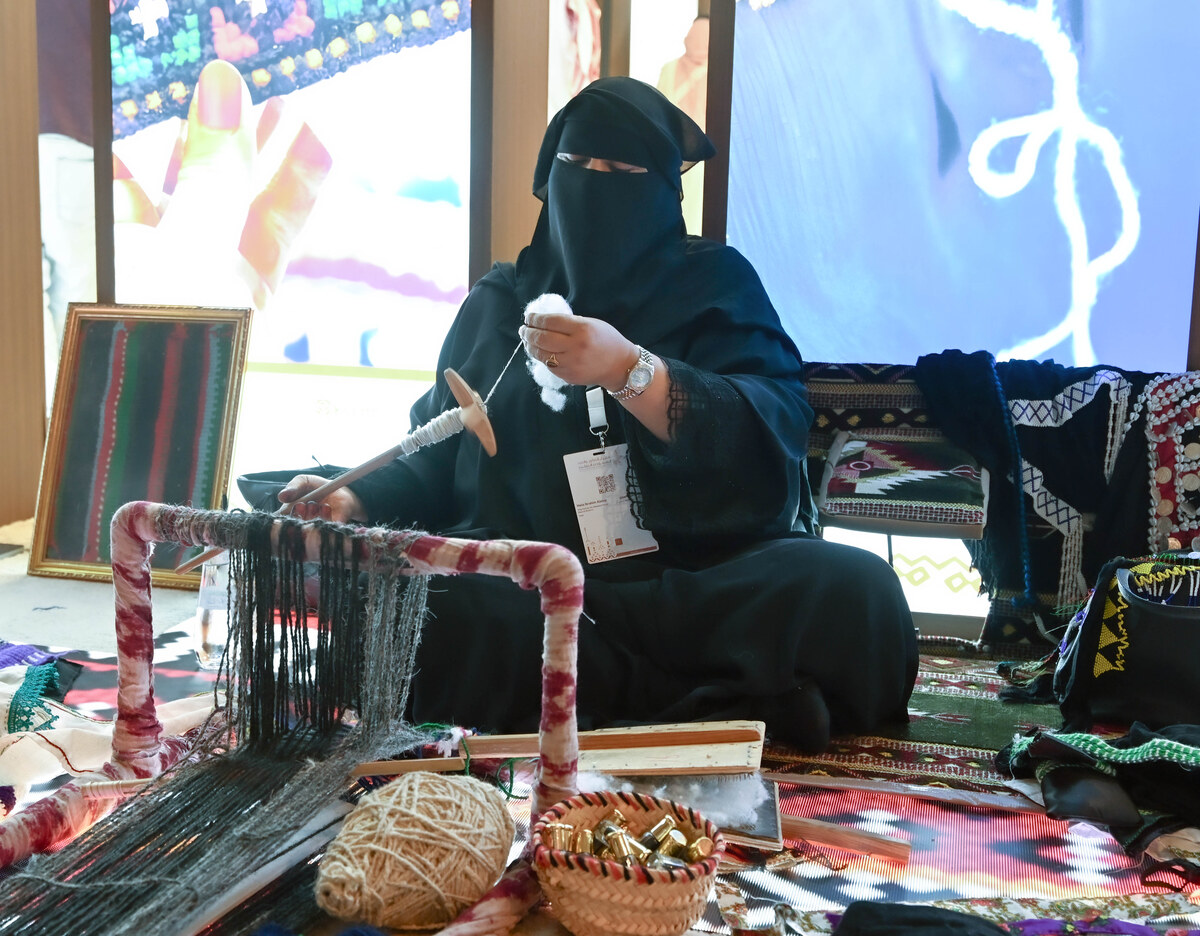Riyadh: Women have played a significant role in the art of falconry throughout history, often intertwining their passion for the sport with their positions of power and influence.
Shalayel Museum, dedicated to unraveling the world of falconry, is one of the main attractions at the Saudi Falcons and Hunting Exhibition, organized by the Saudi Falcons Club at the Riyadh Exhibition and Convention Center in Malham.
Notable figures highlighted in the “Women in Falconry” section include Sultana Chand Bibi of India, who not only defended her kingdom against Mughal forces but also revealed a love for falcons, often depicted in paintings of her era.
Similarly, Queen Christina of Sweden, an intellectual and patron of the arts, was known for her hunting expeditions accompanied by falcons, while Eleanor of Arborea introduced legislation to protect falcons, reflecting her dedication to the study of birds.
Other royal figures, such as Mary of Burgundy and Catherine the Great, embraced falconry as both a pastime and a status symbol, demonstrating their prowess in a sport historically reserved for the elite.
In contemporary times, falconry is a space where women such as Saudi Adhari Al-Khaldi continue to challenge stereotypes, continuing the legacy of female falconers who have shaped this noble pursuit across centuries and cultures.

The Peregrine is known as the fastest animal and bird on the planet, diving at speeds exceeding 240 km/h (AN/Basheer Saleh)
The sections in the museum focus on falcons, falconers and falconry in the Arab world and globally.
A museum spokesperson highlighted the four main types of falcons found in the Arabian Peninsula: the gyrfalcon, peregrine falcon, lanner falcon, and saker falcon.
“Each of these majestic birds has unique characteristics, ecological significance, and historical relevance, particularly in the rich falconry traditions of the region,” they told Arab News.
The gyrfalcon is the largest species of falcon, primarily inhabiting polar and subpolar regions across North America, Greenland, Europe and Asia.
“They are distinguished by their broad chests, powerful wings and relatively short tails. A prominent brow above their eyes and long, sharp talons further enhance their formidable appearance,” the spokesperson said.
The saker falcon is renowned for its historical significance and resilience, breeding across northeast Africa, the Arabian Peninsula, and parts of South Asia.

A gauntlet is a protective hand cover, typically made of leather and fabric, used to carry the falcon safely. (AN/Basheer Saleh)
“Historically, Arabs were the first to recognize and hunt with saker falcons, establishing a deep-rooted connection with this species,” the spokesperson added.
Known for its remarkable endurance, the saker can withstand hunger and is resistant to various diseases.
“This falcon is capable of reaching speeds up to 300 kph (186 mph), making it one of the fastest birds of prey.”
The lanner falcon, is a medium-sized bird found primarily in Africa and Southeast Asia, with limited migration patterns.
The spokesperson said: “While they primarily inhabit Africa and southeast Europe, their presence extends just into Asia. Their adaptability to various environments and their striking appearance contribute to their status among bird enthusiasts.”

For Al-Enezi, Sadu weaving embodies the stories and traditions of her ancestors, serving as a bridge between generations.(AN/Basheer Saleh)
The peregrine falcon deserves mention as one of the most well-known falcons globally, renowned for its incredible speed and hunting prowess.
“The peregrine is known as the fastest animal and bird on the planet, diving at speeds exceeding 240 kph (149 mph).”
They described how, as we continue to explore and preserve these remarkable birds, we celebrate their role in the ecosystem and their significance in our cultural history.
The museum also has a dedicated section for falconry equipment essential for the successful training and handling of these magnificent birds.
The gauntlet, a protective hand cover typically made of leather and fabric, is used to carry the falcon safely.
To keep track of the bird during flight, a transmitter is used, allowing falconers to monitor their falcon’s location wirelessly.
When not in flight, the falcon rests on a block perch, a cone-shaped stand made of wood or iron, featuring a flat base covered with artificial grass or fabric, and a sharp-tipped metal piece to secure it to the ground.
For observing falcons in action, a hunting scope, a high-quality binocular, is indispensable.
The swing, made from the wings of a bustard, is used to attract the falcon’s attention. To ensure the bird’s health, falconers regularly measure its weight.
A hood — a leather head covering —keeps the falcon calm by blocking its vision, while the mangalah is a fabric tool used to carry the bird, often lined with artificial grass.
Finally, jesses, the strings tied to the falcon’s legs, connect to a leash, allowing for secure handling and control. Together, these tools enhance the bond between falconer and falcon, ensuring a successful hunting experience.
The Weaving Heritage section, much enjoyed by visitors, displays local traditional crafts that represent the country’s heritage and national identity, including weaving traditional textiles.
Haila Al-Enezi, a passionate advocate for the preservation of traditional crafts, told Arab News that Sadu weaving is not just an art form but a vital expression of Saudi Arabian heritage.
“This intricate craft, characterized by its geometric patterns and vibrant colors, reflects the Bedouin lifestyle and their deep connection to the desert environment.”
For Al-Enezi, Sadu weaving embodies the stories and traditions of her ancestors, creating a bridge between generations.
She said: “Each piece carries cultural significance representing unity, identity, and the resilience of Saudi women who have historically played a crucial role in sustaining these practices.”
Through her work, Al-Enezi hopes to inspire a new appreciation for Sadu weaving, ensuring that this cultural treasure continues to thrive in modern society.






























